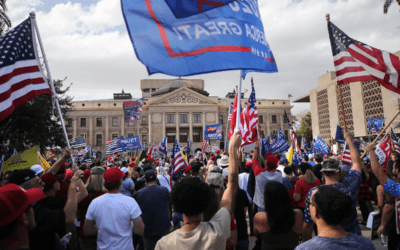
Voters deliver their ballots to a polling station on Nov. 3, 2020, in Tempe, Ariz. Texas has become the latest state where Republicans have rolled back access to voting methods that soared in popularity during last year’s pandemic presidential election. The Texas bill, expected to be signed soon by Gov. Greg Abbott, follows similar legislation this year in Arizona, Florida, Georgia, Iowa and some other GOP-controlled states. (AP Photo/Matt York, File)
PHOENIX – Low-income voters accounted for an estimated 35% of the 168 million votes cast nationwide in the 2020 presidential election, and in Arizona that percentage was estimated to be nearly 40, according to a recent study by the Poor People’s Campaign.
The Poor People’s Campaign: A National Call for Moral Revival is a nonpartisan voter outreach drive. Its study, “Waking the Sleeping Giant: Poor and Low-Income Voters in the 2020 Election,” was conducted in all 50 states and included a special focus on nine “battleground states,” including Arizona.
The study said that nearly 2.5 million low-income voters, with an annual household income of less than $50,000, were eligible to vote in Arizona. The study was based on early voter tallies, which could change as voter records are matched, according to analytics firm TargetSmart, which supplied the data. Current data shows that in Arizona, 3.4 million votes were cast statewide, according to the Arizona secretary of state, and 158.4 million people voted nationwide, according to Pew Research Center. The early data used indicated 3.71 million Arizonans voted and 168 million voted nationwide.
Low-income Arizonans cast more than 1.4 million votes in the 2020 general election, according to the study, nearly 40% of votes statewide. Low-income white voters accounted for 29% of the Arizona vote, and low-income Hispanic and Black voters accounted for 8.1% and 0.4%, respectively, the study said.
RELATED: Workers Lost Income Over the Pandemic While Arizona Billionaires’ Wealth Soared to New Heights
There was no data specific to Indigenous/Native American voters. A supplement to the study will be added next year to include more information on Native American voters, said Shailly Gupta Barnes, Poor People’s Campaign policy director.
The study cited disinterest in politics among poor and low-income voters as the reason for low voter turnout in previous general elections.
“I just want to stress it’s not apathy,” voting rights attorney Penda Hair said during a news conference discussing the study. “This report shows it is systemic factors that include a lack of discussion of issues of interest of poor people and political dialogue, a lack of candidates to run on a moral agenda and, at least as importantly, a lack of candidates to stick to that moral agenda once they get elected and fight for it with all the strength they have.”
Gupta Barnes said community organizing across the country contributed to record high voter turnout on Nov. 3, 2020.
Mass meetings, protests and educational and cultural activities created “a kind of community that I think a lot of people are craving,” Gupta Barnes said.
And because of the COVID-19 pandemic, additional measures‚such as mail-in-ballots, same-day voter registration, drive-thru voting and community organization—not only made it easier for people to vote but encouraged those who hadn’t voted in previous years to cast ballots.
Looking for the latest Arizona news? Sign up for our FREE daily newsletter.

He said what? 10 things to know about RFK Jr.
The Kennedy family has long been considered “Democratic royalty.” But Robert F. Kennedy, Jr.—son of Robert F. Kennedy, who was assassinated while...

Here’s everything you need to know about this month’s Mercury retrograde
Does everything in your life feel a little more chaotic than usual? Or do you feel like misunderstandings are cropping up more frequently than they...

Arizona expects to be back at the center of election attacks. Its officials are going on offense
Republican Richer and Democrat Fontes are taking more aggressive steps than ever to rebuild trust with voters, knock down disinformation, and...

George Santos’ former treasurer running attack ads in Arizona with Dem-sounding PAC name
An unregistered, Republican-run political action committee from Texas with a deceptively Democratic name and ties to disgraced US Rep. George Santos...




